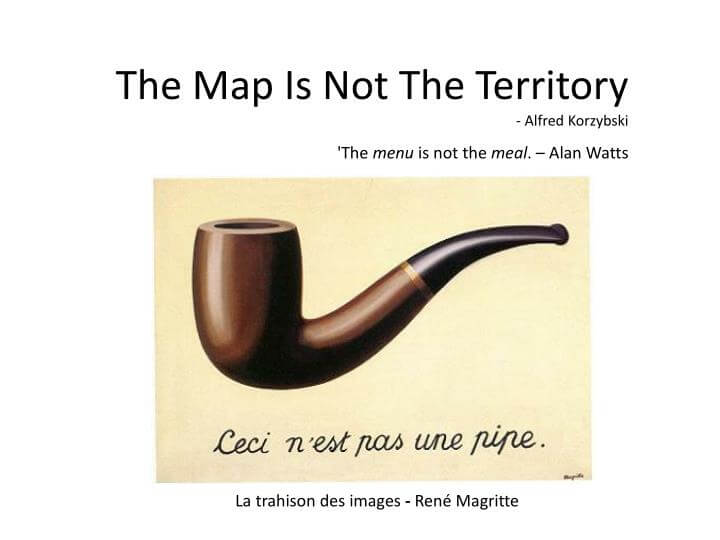
from a wonderfully indepth powerpoint deck by Cristiano Damiani Vasconcellos
Language is powerful. Stunningly so. The language we use about ourselves and others can fundamentally change our perception of reality.
Tip of the hat (or, as cyclists say, chapeau) to David D’Souza today for sharing on Twitter a wonderful and in-depth article from Farnam Street explaining the background to this concept and giving me a nudge to share it with readers.
René Magritte’s: “this is not a pipe” brings our attention to what is and is not true from our language. What we say and believe (the map) does not make it real (the territory).
The more awareness we bring to language, the more we can reduce the gap between the drawing of the pipe and the pipe itself, between the map and the territory, the menu and the meal.
Let’s take confidence as a theme I see often in clients. Once they start to believe they lack confidence, they tend to further embed that lack of confidence by using language that reinforces it, even if objective and measurable elements in their life and work (the reality, the “territory”) actually shows them to be much more confident in certain areas than they thought they were.
Now, we can get into scientific detail around this concept, as the powerpoint linked to the picture in this post does, as does the Farnam Street article linked to above. If you find this theme interesting, do follow both those links. If you love them, you may go down a rabbit hole and see how deep it goes. For me, I study language constantly, I love it!
From me today, though, I love simplicity, as in the post: “Simplicity on the other side of complexity“. The concept of “the map is not the territory” first was taught to me in learning NLP from Ed Percival. He was an early master of NLP and then went way beyond those core learnings to create many simple ways to get us to bring awareness to the language we use and the impact on ourselves and others. A few such examples from Ed that may support you in awareness of language and the impact it has in shifting your reality.
- “Have a safe flight!”. While well-intentioned, to some level this embeds in teh person going on the flight the thought that “oh, it might not be safe”. How about “have a good trip”, or even try (see linked post) “Hamba Kahle“.
- “Feel free to ask“. Similarly, it implies subconsciously the opposite of being free to, instead being restricted. Ed used to say “feel good about” instead.
- “Don’t hesitate to ask“. Hmm. At this point hopefully you already understand the points here and will never, ever use that again.
A final one is a story about a little language trick Ed used every time he ran a workshop. At some point in the first hour or so, someone would always sneeze (due to air conditioning, change of light, something). As they sneezed, someone would always say “Bless You”. Ed would then explain how “Bless You” was a compression of three words. ie Be Less You. He would then say he preferred to always say “Be More You, so anytime from that point on that anyone sneezed he would say “Be More You”.
All of his simple language awareness pieces were always delivered with a smile and light-hearted, yet you know what? Everyone who ever met and worked with Ed felt the impact of “Be More You”.
In closing, you will see at the top of this page some page links. Typically for a sounding board and coach, I might have had a page with a title such as “Work with Me” so that potential clients could see whether we may be a fit and what my process is.
However, as you can see, no such title exists. Instead, there is a page honouring Ed Percival. It simply says #BeMoreYou.
If you’d like help in being more you, in your map becoming closer to your territory, your beliefs to your reality, reinforced by your own awareness and use of language, as Ed would say, feel good about contacting me.
